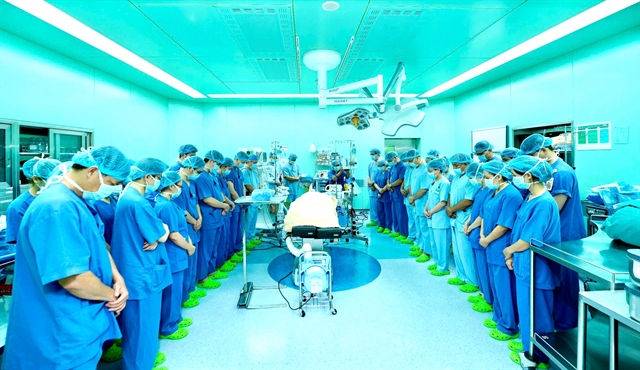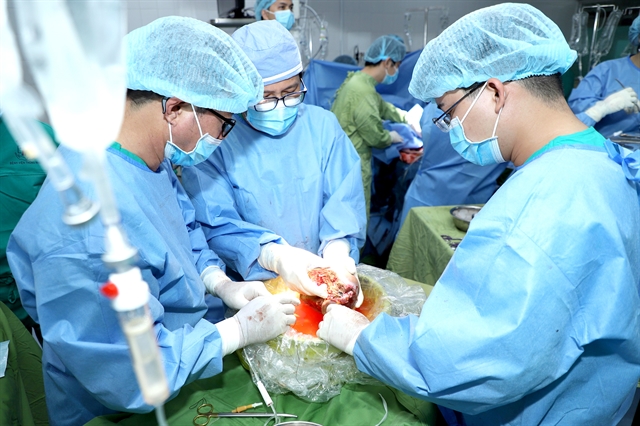 Society
Society

 |
| Medical staff of the HCM City University of Medicine and Pharmacy Hospital take a moment of silence to pay tribute to an organ donor before performing organ removal. — VNA/VNS Photo Đinh Hằng |
HÀ NỘI — Nearly two decades after the Law on Donation, Removal and Transplantation of Human Tissues, Organs and Cadavers was promulgated, Việt Nam has performed nearly 10,000 organ transplants, of which more than 90 per cent were from living donors.
However, after such a long time, the law has revealed many limitations.
The Ministry of Health (MoH) is seeking opinions to amend and supplement the law to give more chances to thousands of patients every year.
Adjustment
The first person in Việt Nam donated organs after brain death in 2010.
After 15 years, as many as 225 people across the country have donated their organs after brain death.
Deputy Minister of Health Trần Văn Thuấn said that the law, passed by the National Assembly in 2006, was the first legal document in Việt Nam that laid the foundation for a more humane and advanced medical field.
Thanks to this legal corridor, Việt Nam had performed thousands of organ transplants, built a network of 27 medical facilities with sufficient technical capacity and gradually mastered many complex transplant techniques, such as simultaneous heart-liver transplants, trachea transplants and lung transplants.
“After nearly two decades of implementation, the practical context, technological level, patient needs and healthcare management requirements have changed dramatically. The law is revealing some shortcomings and has not kept up with the industry’s development,” said Thuấn.
Amending the law is therefore an urgent requirement, in line with the spirit of the Politburo’s Resolution 66-NQ/TW issued on April 30 on innovation in lawmaking and enforcement, in order to meet the requirements of national development in the new era, according to the ministry.
The resolution states that the law must be closely linked to reality, stemming from requirements for development as well as respecting and serving the people.
However, many issues have not been regulated or are not fully regulated by the current law.
Specifically, there is no synchronous financial mechanism for the entire chain of donation, collection, transportation, preservation and transplantation; people under 18 years old are not allowed to donate organs, even in cases of voluntary will and family consent; and the brain death diagnosis process – a prerequisite for determining the ability to donate – is still complicated, lengthy and lacks easy-to-apply standards.
In addition, the rate of organ donation from brain-dead people is still very low, while more than 90 per cent of transplanted organs currently come from living donors, causing many ethical and legal challenges.
Thuấn said that the law's amendment should be seen as an institutional breakthrough, ensuring feasibility and consistency as well as creating a sustainable, humane and effective legal foundation for the organ transplantation field.
The amended law needs to approach advanced international practices, but still ensure conformity with traditional customs, practical conditions and implementation capacity in Việt Nam.
Donors
 |
| Doctors conduct a liver transplant at the Thống Nhất Hospital in HCM City. — VNA/VNS Photo Đinh Hằng |
Associate Professor Đồng Văn Hệ, Director of the National Organ Transplant Coordination Centre and also Deputy Director of the Việt Nam-Germany Hospital, said that it was necessary to add regulations allowing children and people with cardiac death to donate organs.
The amended law should also clearly stipulate a financial mechanism for both transplant recipients and donors, Hệ said.
At present, a financial mechanism for transplant recipients does not exist. For donors, it exists but is still very limited.
“With 31 transplant centres nationwide, Việt Nam should be able to perform 10 times more organ transplants than it does now. The problem is that we do not have a source of donations. Without a large enough financial mechanism, organ donation and transplantation activities will face many obstacles,” said Hệ.
A notable point in the new draft is the rule that if a person has registered to donate tissues and organs before death, after being determined to have undergone brain or cardiac death, medical facilities can proceed to collect organs without further consent from the family.
This regulation aims to respect the donor’s wishes, shorten procedures and comply with international practices.
In cases the deceased person is not registered as an organ donor, the removal of tissues or body parts still requires written consent from the legal representative or guardian, after the donor is determined to be brain dead.
The draft law also proposes to expand the scope of organ donation to include people under 18 years in cases of brain death or cardiac death, with a legal representative’s consent.
This is considered an important point that would help increase the number of donated organs, which is always low.
Experts believe that tissues and organs of people under 18 can be transplanted to patients, especially children. Globally, many countries including France and other European nations have allowed people under 18 to donate tissues and organs after death with written consent from parents or guardians.
Expanding this age range will create opportunities to save the lives of more children in need of organ transplants.
Although organ donation is for humanitarian and non-commercial purposes, many experts believe that there should be a policy to properly care for donors’ relatives.
According to current regulations, relatives of donors are supported with funeral expenses equivalent to 10 months of basic salary. Organ or tissue donors are posthumously awarded the "For People's Health" medal by the MoH.
Deputy Director of the National Organ Transplant Coordination Centre Nguyễn Hoàng Phúc said that more policies for donors were needed.
For brain-dead donors, Phúc proposed exempting all medical examination and treatment costs before donation; supporting the cost of transporting the body to the locality for burial; giving free health insurance cards to the parents or children of the donor for three to five years; and giving priority to the donor's relatives on the organ transplant list if they fall into organ failure later.
According to the MoH, the new law aims for a modern, professional coordination system. In particular, the brain death diagnosis process will be simplified to save time and avoid missing out on organ transplant opportunities. — VNS




